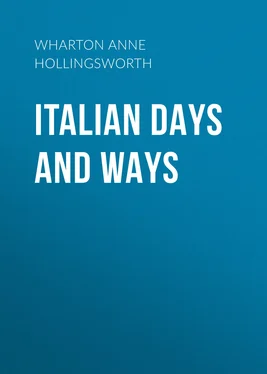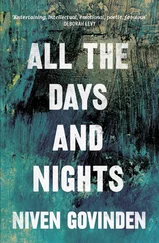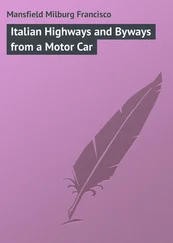Anne Wharton - Italian Days and Ways
Здесь есть возможность читать онлайн «Anne Wharton - Italian Days and Ways» — ознакомительный отрывок электронной книги совершенно бесплатно, а после прочтения отрывка купить полную версию. В некоторых случаях можно слушать аудио, скачать через торрент в формате fb2 и присутствует краткое содержание. Жанр: Путешествия и география, foreign_antique, foreign_prose, на английском языке. Описание произведения, (предисловие) а так же отзывы посетителей доступны на портале библиотеки ЛибКат.
- Название:Italian Days and Ways
- Автор:
- Жанр:
- Год:неизвестен
- ISBN:нет данных
- Рейтинг книги:4 / 5. Голосов: 1
-
Избранное:Добавить в избранное
- Отзывы:
-
Ваша оценка:
- 80
- 1
- 2
- 3
- 4
- 5
Italian Days and Ways: краткое содержание, описание и аннотация
Предлагаем к чтению аннотацию, описание, краткое содержание или предисловие (зависит от того, что написал сам автор книги «Italian Days and Ways»). Если вы не нашли необходимую информацию о книге — напишите в комментариях, мы постараемся отыскать её.
Italian Days and Ways — читать онлайн ознакомительный отрывок
Ниже представлен текст книги, разбитый по страницам. Система сохранения места последней прочитанной страницы, позволяет с удобством читать онлайн бесплатно книгу «Italian Days and Ways», без необходимости каждый раз заново искать на чём Вы остановились. Поставьте закладку, и сможете в любой момент перейти на страницу, на которой закончили чтение.
Интервал:
Закладка:
My Jehu now regained the use of his tongue, and unblushingly insisted upon a two hours' fee for the drive of a trifle over an hour which I had been coerced into taking. The sum was not extortionate, according to American ideas, but no one wishes to be cheated, especially with one's eyes wide open. I protested, explained the state of affairs to the concierge, when, to my surprise, he, my ally and champion as I had thought him, deserted me at this critical moment and joined the enemy, saying, "The signorina would do well to pay the vetturino what he asks, as according to the signorina's own watch she has had the cab over an hour."
My humiliation was great when I handed the triumphant cabman his ill-gotten gains, but greater still was my disappointment over the defection of the concierge, whom we have all trusted. It seems, indeed, as if every man's hand is against us in this beautiful city, from the salesman who tries to sell us imperfect coral to the crafty vendor of fruit who slips bad oranges into a paper bag for us, while he tries to distract our attention by sentimental remarks on the weather and the "bella vista."
Rather than trust myself to the mercy of another cabman, I ignominiously made my way down the many steps of the terrace to the street below, where I took a tram to the Chiaia. Angela was seated in the carriage, looking around anxiously, while Zelphine was walking up and down the pavement, both evidently much disturbed, wondering what had detained me.
"There is still time to take the drive," I said, in reply to their eager questions. "I saw a number of carriages coming down by the Square of the Martyrs. Get in, Zelphine, and I will explain my delay as we drive along."
All Naples seemed to be en voiture , this afternoon, and it was pleasant to be making a course with the languid, dark-eyed ladies and their attendant cavaliers, even if we were not intimately associated with them.
March 7th.This whole morning we spent in the Aquarium, which is down near the sea, a part of the Villa Nazionale. Here we saw all manner of beautiful and hideous creatures of the deep, some exquisitely colored fish from the Mediterranean, living coral, medusæ, crested blubbers, airy and transparent as soap-bubbles, and the wonderful octopus. Angela insisted on seeing these horrible creatures fed, and by the time that important ceremony was over and we had walked through the shaded park enjoying the flowers, which are blooming in profusion everywhere, it was time to go home for our second breakfast.
We went to Posilipo in the steam tram, this afternoon, and were shown the old Roman columbarium on the hillside, popularly known as the Tomb of Virgil. Whether or not the poet was buried there is now disputed by scholars; however, Zelphine says that Virgil certainly wrote his "Georgics" and "Æneid" in his villa near by, and that Petrarch considered this tomb sufficiently important to plant a laurel here. She and I have no patience with the iconoclasts who take so much pleasure in destroying our illusions, and we see no reason why the traveller should not be allowed to weep over this tomb of Virgil, unless, indeed, a more authentic one can be furnished him.
Later we climbed up to the terraced garden that belongs to the Ristorante Promessi Sposi—fancy an inn at home named The Betrothed! Here we had afternoon tea, while our eyes were feasted with the beauties of a gorgeous sunset. Vesuvius, Capri, Ischia, and all the smaller islands of the bay were bathed in heliotrope light, a royal array of purple velvet. Buchanan Read's lines on the Bay of Naples must have been inspired by just such a sea and sky as this. Zelphine evidently had the same thought, for she quoted softly:
"'My soul to-day
Is far away,
Sailing the Vesuvian Bay;
My winged boat,
A bird afloat,
Swims round the purple peaks remote.'"
We should have been in a boat on the purple bay instead of in a tram!
I am finishing this letter rather hurriedly for to-night's mail, as we shall be off to-morrow bright and early for a tour of several days, to Pompeii, La Cava, and Pæstum, returning by the coast drive and stopping at Amalfi and Sorrento. It is the sort of excursion that you would enjoy so much—would you like to be of the party?
IV
AN EXCITING DRIVE
We have spent the day in the streets and houses of Pompeii, living over again in the buried city the thrilling scenes of Lord Lytton's novel. His descriptions are still marvellously accurate, although so much has been unearthed since he wrote "The Last Days of Pompeii" that the ruins as they stand to-day are much more extensive than those pictured by the novelist. The house of Glaucus is called by the guides the House of the Tragic Poet, but the mosaic of the dog, with its inscription, "Cave canem," apparently as perfect as in the days when Glaucus thus whimsically greeted his friends and enemies, serves to identify it.
Lord Lytton was in Naples during the winter of the most important excavations at Pompeii, and his romance doubtless took form and shape as he walked through these deserted streets, where the ruts made by the chariot-wheels of the two rivals, Glaucus and Arbaces, are still to be seen. The houses, as he tells us, still undespoiled of their exquisite decorations and rich furniture, were much as their unfortunate owners left them. Even now, despite the fact that many of the beautiful frescoes, statues, busts, and other ornaments have been taken to the Naples Museum, much is still left of the interior of the houses, enough to give one a very good idea of how these luxurious Pompeians lived. The lower floors of some of these houses, as that of the Vettii and the Faun, are complete, with their vestibule, dining-room, parlor, bedrooms, and kitchen. These rooms are all rather small, according to our ideas, as the wise Pompeians lived out of doors, spending their days in the large central court of their houses or in the gardens. Of the gardens we saw the most perfect examples in the house of the Vettii. The restoration seems to have been made most carefully here as elsewhere; even the graceful bronze statuettes are not wanting, as excellent replicas have been put in the places of the originals, which are in the Naples Museum.
Nothing brings the reality of that old life before us more forcibly than to walk along the streets, where the bakeries and the wine and oil shops are still to be found. In the latter are many great jars, which are, as Zelphine says, not unlike those in which Morgiana entrapped her Forty Thieves.
Turning a corner, we were startled by seeing a roughly drawn sketch upon a wall, such as any street gamin of to-day might draw upon a tempting blank surface. Further along the same street we beheld a still stronger evidence that the life of Pompeii was not altogether different from that of our own time. Something corresponding to a modern poster announced in red letters the name of a favorite candidate for the next municipal election. We lingered long in the vast amphitheatre, in which the Pompeians were wont to take their pleasure, protected in sunny weather by an awning, whose usefulness we could appreciate to-day, as the sun of March is intensely hot in this region. The barracks for the gladiators, near the theatre, are not unlike the casemates for soldiers in a fort, and are quite complete. Zelphine, who is sitting near me, poring over Bulwer's novel, has just read me Pansa's lament over what he considered an infamous law, that forbade a man to send his own slaves to the wild beasts in the arena. Having seen the houses of Glaucus and Pansa, one can more readily understand the point of view of these luxurious, pleasure-loving ancients, who were probably not more cruel than many of their contemporaries.
We left Pompeii late this afternoon and came to La Cava, a pretty town in the mountains, where we are stopping on our way to Pæstum. Zelphine has just been talking to the padrone , who speaks excellent English, about the excursion to-morrow. Our tickets, which we bought of the concierge at the Hotel B., entitle us to a drive or a railway journey. The padrone strongly advises the former. He says the trains are so slow and the waits so long that we make almost as good time by driving, and then it is much more interesting. The drive is between forty and fifty miles, but by starting at eight o'clock in the morning, and changing horses at Battipaglia, we shall have two hours at Pæstum and get back to this hotel in time for dinner. Another party of American travellers, of the inconvenient number of five, go by coach to-morrow. The padrone asks us, in case we decide to drive, whether we will give a seat in our carriage to the odd number. Having concluded to drive, we are hoping that the fifth wheel of the other coaching-party may prove to be Mrs. Coxe, a charming old lady who talks most picturesquely of a drive to Pæstum forty years ago, when the roads were so infested by brigands that it was necessary to travel with a mounted escort.
Читать дальшеИнтервал:
Закладка:
Похожие книги на «Italian Days and Ways»
Представляем Вашему вниманию похожие книги на «Italian Days and Ways» списком для выбора. Мы отобрали схожую по названию и смыслу литературу в надежде предоставить читателям больше вариантов отыскать новые, интересные, ещё непрочитанные произведения.
Обсуждение, отзывы о книге «Italian Days and Ways» и просто собственные мнения читателей. Оставьте ваши комментарии, напишите, что Вы думаете о произведении, его смысле или главных героях. Укажите что конкретно понравилось, а что нет, и почему Вы так считаете.












